8—19学年上学期高二开学考试英语试题(附答案) (1)
2019级高二学年上学期开学验收考试英语试题
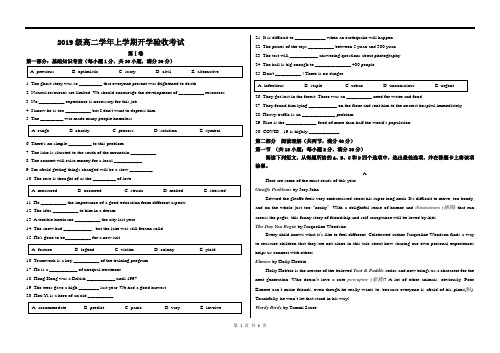
2019级高二学年上学期开学验收考试第Ⅰ卷第一部分:基础知识考查(每小题1分,共30小题,满分30分)1. The ghost story was so _________ that everyone present was frightened to death.2. Natural resources are limited. We should encourage the development of __________ resources.3. No __________ experience is necessary for this job.4. I know he is too __________ but I don't want to depress him.5. The _________ war made many people homeless.6. There's no simple _________ to this problem.7. The lake is situated to the south of the mountain __________.8. The concert will raise money for a local ___________.9. I'm afraid getting things changed will be a slow _________.10. The rose is thought of as the _________ of love.11. He __________ the importance of a good education from different aspects.12. The idea __________ to him in a dream.13. A terrible hurricane __________ the city last year.14. The snow had ___________ , but the lake was still frozen solid.15. He's gone to be__________ for a new suit.16. Teamwork is a key __________ of the training program.17. He is a ___________ of unequal treatment.18. Hong Kong was a British ___________ until 1997.19. The trees gave a high ________ last year. We had a good harvest.20. Hou Yi is a hero of an old __________.21. It is difficult to ____________ when an earthquake will happen.22. The prices of the toys __________ between 5 yuan and 300 yuan.23. The test will ___________ answering questions about photography.24. The hall is big enough to ______________ 400 people.25. Don't __________ ! There is no danger.26. They got lost in the forest. There was an __________ need for water and food.27. They found him lying ___________ on the floor and sent him to the nearest hospital immediately.28. Heavy traffic is an _____________ problem.29. Rice is the ____________ food of more than half the world's population.30. COVID - 19 is highly ____________.第二部分阅读理解(共两节,满分40分)第一节(共15小题;每小题2分,满分30分)阅读下列短文,从每题所给的A、B、C和D四个选项中,选出最佳选项,并在答题卡上将该项涂黑。
19学年上学期高二开学考试英语试题(附答案)
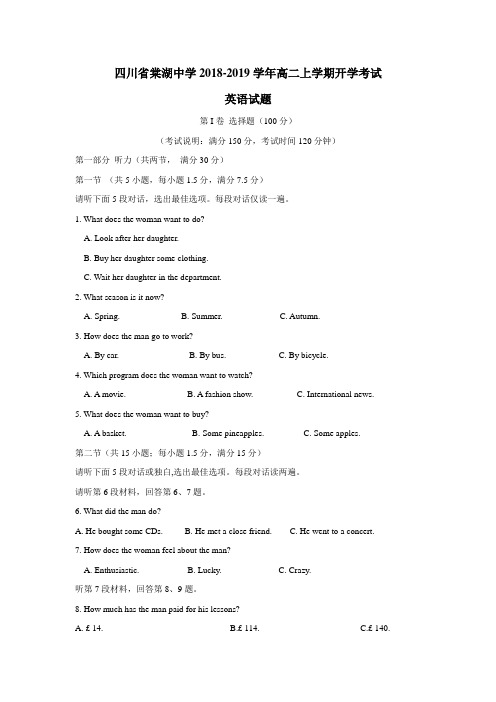
四川省棠湖中学2018-2019学年高二上学期开学考试英语试题第I卷选择题(100分)(考试说明:满分150分,考试时间120分钟)第一部分听力(共两节,满分30分)第一节(共5小题,每小题1.5分,满分7.5分)请听下面5段对话,选出最佳选项。
每段对话仅读一遍。
1. What does the woman want to do?A. Look after her daughter.B. Buy her daughter some clothing.C. Wait her daughter in the department.2. What season is it now?A. Spring.B. Summer.C. Autumn.3. How does the man go to work?A. By car.B. By bus.C. By bicycle.4. Which program does the woman want to watch?A. A movie.B. A fashion show.C. International news.5. What does the woman want to buy?A. A basket.B. Some pineapples.C. Some apples.第二节(共15小题;每小题1.5分,满分15分)请听下面5段对话或独白,选出最佳选项。
每段对话读两遍。
请听第6段材料,回答第6、7题。
6. What did the man do?A. He bought some CDs.B. He met a close friend.C. He went to a concert.7. How does the woman feel about the man?A. Enthusiastic.B. Lucky.C. Crazy.听第7段材料,回答第8、9题。
2019学年高二英语上学期开学考试试题新 版新人教版

亲爱的同学:这份试卷将再次记录你的自信、沉着、智慧和收获,我们一直投给你信任的目光……2019年度高二上学期开学考试英语试题第一部分:阅读理解(共两节,满分40分)第一节(共15小题;每小题2分,满分30分)阅读下列短文,从每题所给的四个选项(A、B、C和D)中,选出最佳选项,并在答题卡上将该项涂黑。
ALet’s Go Science Show Times:Wednesday, November12, 2017 at 10: 00 am. Tickets: $9. 00 per person for groups of ten or more; $14. 00 for individuals. The wacky and talented Professor Smart and Dr. Knowitall join forces for an educational, entertaining, exciting experiment demonstrating the basic principals of science. During the show you and your students will learn about air pressure, figure out flight, and get a handle on the scientific method. Appropriate for Grades 1—5.The Wizard of OZ Show Times: Tuesday, December 18, 2017 at 9: 00 am. Tickets: $10. 00 per person for groups of 10 or more; $14. 00 for individuals. Follow the yellow brick road. Join in Dorothy’s adventures over the rainbow with the Tin man, Scarecrow, Lion and, of course, the Wizard himself. More excitement is created when a life-size tornado travels from the stage through the audience. Meet old friends and new in this imaginative fun filled musical. Award-winning lighting and special effects. Appropriate for all ages.Charlotte ’s Web Show Times: Thursday, December 4, 2017 at 11: 00 am & 12 noon. Tickets: $12. 00 per person for groups of 20 or more; $17. 00 for individuals. Charlotte’s Web is a beloved and memorable children’s classic that comes to life on stage in this musical story.The story is set in a Midwest country farm in the first half of the twentieth century. Meet Fern Arable, an imaginative eight-year-old farm girl, Wilbur, a small lovable pig, Charlotte, a large intellectual spider and Templeton, a lazy yet clever rat. You’re sure to fall in love.Appropriate for Grades Pre-Kindergarten — 3rd grade.1. A father with his son to see Science Show will pay______.A. $9. 00B. $18. 00C. $28.00 D. $14. 002.A boy who likes stories about wizards will watch the musical at______.A. 10: 00 amB. 12 noonC. 15: 00 pmD. 9: 00 am3.Where does the story of a little girl with several animals take place?A. On a brick road.B. On a farm.C. In a kindergarten.D. In a college library.BPulling heavy suitcases all day in the summer is hard work, especially when you’r e a thin 14-year-old. That was me in 1940—the youngest and smallest baggage boy at New York City’s Pennsyl vania Railway Station.After just a few days on the job, I began noticing that the other fellows were overcharging pas sengers. I’d like to join them, thinking, “Everyone else is doing it.”When I got home that night, I told my dad what I wanted to do. “You give an honest day’s work,” he said, looking at me straight in the eye. “They’re paying you. If they want to do that, you let them do that.”I followed my dad's advice for the rest of that summer and have lived by his words ever since.Of all the jobs I've had, it was my experience at Pennsylvania Railway Station that has stuck with me. Now I teach my players to have respect for other people and their possessions. Being a member of a team is a totally shared experience. If one person steals, it destroys trust and hurts everyone. I can put up with many things, but not with people who steal. If one of my players were caught stealing, he'd be gone.Wheth er you’re on a sports team, in an office or a member of a family, if you can’t trust one another, there’s going to be trouble.4. What can be inferred about the baggage boys?A. They could earn much, but they had to work hard.B. Many of them earned money in a dishonest way.C. They were all from poor families.D. They were all thin, young boys.5. What does the father's advice imply(暗示)?A. It is wrong to give more pay to the passengers.B. Don’t believe them if they are paying you more.C. Don’t fol low others to overcharge the passengers.D. It is difficult to work hard and live as an honest boy.6. The writer can't put up with stealing because he thinks that ______.A. it is a totally shared experienceB. it is considered as the most dangerousC. it does great harm to human relationshipD. it may lead to the loss of his sports team7. It can be concluded from the text that ______.A. his father's advice helped him to decide which job to take upB. working in the sports team was his most important experienceC. he learnt much from his shared experience with his team membersD. his experience as a baggage boy had a great influence on his later lifeCGreat white sharks! Just hearing that name makes many people’s hair stand on end. In reality, these big fish have more to fear from us than we do from them. For many years, people killed countless great white sharks in the waters around the United States.But thanks to conservation (保护) efforts, great whites are making a comeback in the U.S. Two recent studies show that the population of these sharks is rising along the east and west coast.Why is the growing population of a killer fish something to celebrate? “When you fish too many of them, you start to lose balance in the environment,” says shark researcher Tobey Curtis. As the biggest killer, sharks help keep the populations of fish, seals, and other creatures they eat from growing too large.In spite of their importance, great white sharks had long been hunted for theirmeat and their fins (鳍). Then, in 1997, the U.S. government passed a law that didn’t allow the hunting of great whites. Afterwards, the numbers of these sharks in the U.S. waters started to increase.The law wasn’t the only thing that has helped great whites. Conservationist s have also played a part in the sharks’ comeback. The research group OCEARCH is using a method called tagging (加标签) to help change people’s attitudes about great white s. They let the public follow each shark as it travels the world’s oceans. OCEARCH also gives each tagged shark a name to help people form a closer connection with the big fish.The group’s most well-known shark is named Katharine. She was tagged last year near Cape Cod, Massachusetts. Since then, thousands of people have tracked(追踪)Katharine’s movements on Twitter and the OCEARCH website.This helps people see sharks in a new way. Chris Fischer, the founder of OCEARCH believes learning to appreciate great whites will encourage people to do more to protect them.8.The underlined part “makes many people’s hair stand on end” in Paragraph 1 can best be replaced by______.A. worries many peopleB. bores many peopleC. frightens many peopleD. interests many people9.The law passed in 1997 ______.A. seemed very helpfulB. let scientists downC. needed to be changedD. made people like great whites10.Katharine’s example is used to show that ______.A. great whites are in fact lovely animalsB. the OCEARCH website has a lot of visitorsC. the number of great whites is growing quicklyD. OCEARCH help people get closer to great whites11.The main purpose of the passage is to ______.A. introduce an experiment resultB. make an advertisement for OCEARCHC. remind us that big killers are dying outD. inform us that great whites are making a comebackDHave you ever run into a careless cell phone user on the street? Perhaps they were busy talking, texting or checking updates on WeChat without looking at what was going on around them. As the number of this new “species” of human has kept rising, they have been given a new name—phubbers(低头族).Recently, a cartoon created by students from China Central Academy of Fine Arts put this group of people under the spotlight. In the short film, phubbers with various social identities(身份) bury themselves in their phones. A doctor plays with his cell phone while letting his patient die, a pretty woman takes selfie(自拍) in front of a car accident site, and a father loses his child without knowing about it while using his mobile phone. A chain of similar events eventually leads to the destruction of the world.Although the ending sounds overstated(夸大), the damage phubbing can bring is real.Your health is the first to bear the effect and result of it. “Constantly bending your head to check your cell phone could damage your neck,” Guangming Daily quoted doctors as saying. “The neck is like a rope that breaks after long-term stretching.” Also, staring at cell phones for long periods of time will damage you r eyesight gradually, according to the report.But that’s not all. Being a phubber could also damage your social skills and drive you away from your friends and family. At reunions with family or friends, many people tend to stick to their cell phones while others are chatting happily with each other and this creates a strange atmosphere, Qilu Evening News reported.It can also cost you your life. There have been lots of reports on phubbers who fell to their death, suffered accidents, and were robbed of their cell phones in broad daylight.12.For what purpose does the author give the example of a cartoon in Paragragh2?A. To inform people of the bad effects of phubbing.B. To advertise the cartoon made by students.C. To indicate the world will finally be destroyed by phubbers.D. To warn doctors against using cell phones while treating patients. 13.Which of the following is NOT a risk a phubber may have?A. His social skills could be affected.B. His neck and eyesight will be gradually harmed.C. He will cause the destruction of the world.D. He might get separated from his friends and family.14.Which of the following may be the author’s attitude towards phubbing?A. Supportive.B. Opposed.C.Neutral(中立)D. Objective(客观)15.What may the passage talk about next?A. Advice on how to use a cell phone.B. People addicted to phubbing.C. Measures to reduce the risks of phubbing.D. Consequences(后果)of phubbing.第二节(共5小题,每小题2分,满分10分)根据短文内容,从短文后的选项中选出能填入空白处的最佳选项,选项中有两项为多余选项。
2018-2019学年高二英语开学考试试题

2018-2019学年高二英语开学考试试题第一部分听力(共两节,满分30分)第一节(共5小题;每小题1.5分,满分7.5分)1. What is the man wearing now?A. A blue sports shirt.B. A green sports shirt.C. A green T-shirt.2. What’s the relationship between the speakers?A. Mother and son.B. Neighbors.C. Teacher and pupil3. What does the woman give the man?A. Her account number.B. Her gas bill.C. Her password.4. Where does the conversation probably take place?A. In a classroom.B. In a drugstore.C. In a doc tor’s office.5. What does the woman mean?A. She doesn’t want any more homework.B. The man often forgets his homework.C. Nobody did their homework.第二节(共15小题;每小题1.5分,满分22.5分)听第6段材料,回答第6、7题。
6. Where does the woman want to go?A. Shanghai University.B. Disneyland.C. The Oriental Pearl Tower.7. What will the speakers probably do next?A. Call their neighbors.B. Cancel their flight.C. Call a taxi.听第7段材料,回答第8、9题。
2018-2019学年高二英语上学期开学考试(8月月考)试题(含解析)
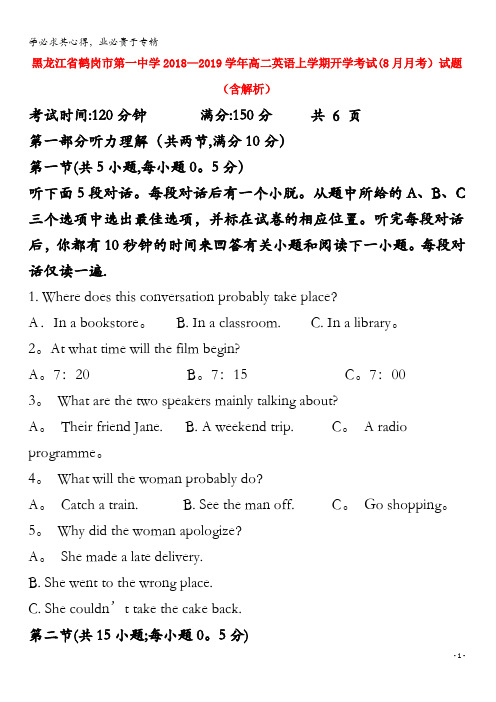
黑龙江省鹤岗市第一中学2018—2019学年高二英语上学期开学考试(8月月考)试题(含解析)考试时间:120分钟满分:150分共6 页第一部分听力理解(共两节,满分10分)第一节(共5小题,每小题0。
5分)听下面5段对话。
每段对话后有一个小脱。
从题中所给的A、B、C 三个选项中选出最佳选项,并标在试卷的相应位置。
听完每段对话后,你都有10秒钟的时间来回答有关小题和阅读下一小题。
每段对话仅读一遍.1. Where does this conversation probably take place?A.In a bookstore。
B. In a classroom. C. In a library。
2。
At what time will the film begin?A。
7:20 B。
7:15 C。
7:003。
What are the two speakers mainly talking about?A。
Their friend Jane. B. A weekend trip. C。
A radio programme。
4。
What will the woman probably do?A。
Catch a train. B. See the man off. C。
Go shopping。
5。
Why did the woman apologize?A。
She made a late delivery.B. She went to the wrong place.C. She couldn’t take the cake back.第二节(共15小题;每小题0。
5分)听下面5段对话。
每段对话后有几个小题,从题中所给的A、B、C 三个选项中选出最佳选项,并标在试卷的相应位置。
听每段对话前,你将有时间阅读各个小题,每小题5秒钟:听完后,各小题给出5秒钟的做答时间。
每段对话读两遍。
听第6段材料,回答第6、7题。
高二英语上学期开学考试试题新 版新人教版
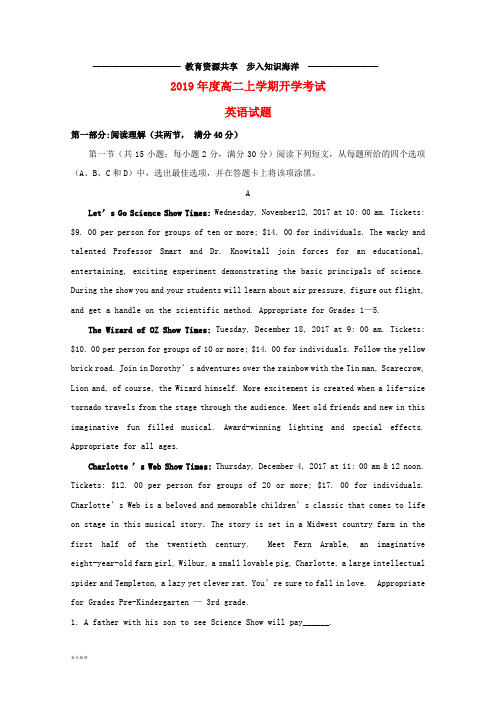
——————————教育资源共享步入知识海洋————————2019年度高二上学期开学考试英语试题第一部分:阅读理解(共两节,满分40分)第一节(共15小题;每小题2分,满分30分)阅读下列短文,从每题所给的四个选项(A、B、C和D)中,选出最佳选项,并在答题卡上将该项涂黑。
ALet’s Go Science Show Times:Wednesday, November12, 2017 at 10: 00 am. Tickets: $9. 00 per person for groups of ten or more; $14. 00 for individuals. The wacky and talented Professor Smart and Dr. Knowitall join forces for an educational, entertaining, exciting experiment demonstrating the basic principals of science. During the show you and your students will learn about air pressure, figure out flight, and get a handle on the scientific method. Appropriate for Grades 1—5.The Wizard of OZ Show Times: Tuesday, December 18, 2017 at 9: 00 am. Tickets: $10. 00 per person for groups of 10 or more; $14. 00 for individuals. Follow the yellow brick road. Join in Dorothy’s adventures over the rainbow with the Tin man, Scarecrow, Lion and, of course, the Wizard himself. More excitement is created when a life-size tornado travels from the stage through the audience. Meet old friends and new in this imaginative fun filled musical. Award-winning lighting and special effects. Appropriate for all ages.Charlotte ’s Web Show Times: Thursday, December 4, 2017 at 11: 00 am & 12 noon. Tickets: $12. 00 per person for groups of 20 or more; $17. 00 for individuals. Charlotte’s Web is a beloved and memorable children’s classic that comes to life on stage in this musical story.The story is set in a Midwest country farm in the first half of the twentieth century. Meet Fern Arable, an imaginative eight-year-old farm girl, Wilbur, a small lovable pig, Charlotte, a large intellectual spider and Templeton, a lazy yet clever rat. You’re sure to fall in love.Appropriate for Grades Pre-Kindergarten — 3rd grade.1. A father with his son to see Science Show will pay______.A. $9. 00B. $18. 00C. $28.00 D. $14. 002.A boy who likes stories about wizards will watch the musical at______.A. 10: 00 amB. 12 noonC. 15: 00 pmD. 9: 00 am3.Where does the story of a little girl with several animals take place?A. On a brick road.B. On a farm.C. In a kindergarten.D. In a college library.BPulling heavy suitcases all day in the summer is hard work, especially when you’re a thin 14-year-old. That was me in 1940—the youngest and smallest baggage boy at New York City’s Pennsyl vania Railway Station.After just a few days on the job, I began noticing that the other fellows were overcharging pas sengers. I’d like to join them, thinking, “Everyone else is doing it.”When I got home that night, I told my dad what I wanted to do. “You give an honest day’s work,” he said, looking at me straight in the eye. “They’re paying you. If they want to do that, you let them do that.”I followed my dad's advice for the rest of that summer and have lived by his words ever since.Of all the jobs I've had, it was my experience at Pennsylvania Railway Station that has stuck with me. Now I teach my players to have respect for other people and their possessions. Being a member of a team is a totally shared experience. If one person steals, it destroys trust and hurts everyone. I can put up with many things, but not with people who steal. If one of my players were caught stealing, he'd be gone.Whether you’re on a sports team, in an office or a member of a family, if you can’t trust one another, there’s going to be trouble.4. What can be inferred about the baggage boys?A. They could earn much, but they had to work hard.B. Many of them earned money in a dishonest way.C. They were all from poor families.D. They were all thin, young boys.5. What does the father's advice imply(暗示)?A. It is wrong to give more pay to the passengers.B. Don’t believe them if they are paying you more.C. Don’t follow others to overcharge the passengers.D. It is difficult to work hard and live as an honest boy.6. The writer can't put up with stealing because he thinks that ______.A. it is a totally shared experienceB. it is considered as the most dangerousC. it does great harm to human relationshipD. it may lead to the loss of his sports team7. It can be concluded from the text that ______.A. his father's advice helped him to decide which job to take upB. working in the sports team was his most important experienceC. he learnt much from his shared experience with his team membersD. his experience as a baggage boy had a great influence on his later lifeCGreat white sharks! Just hearing that name makes many people’s hair stand on end. In reality, these big fish have more to fear from us than we do from them. For many years, people killed countless great white sharks in the waters around the United States.But thanks to conservation (保护) efforts, great whites are making a comeback in the U.S. Two recent studies show that the population of these sharks is rising along the east and west coast.Why is the growing population of a killer fish something to celebrate? “When you fish too many of them, you start to lose balance in the environment,” says sh ark researcher Tobey Curtis. As the biggest killer, sharks help keep the populations of fish, seals, and other creatures they eat from growing too large.In spite of their importance, great white sharks had long been hunted for theirmeat and their fins (鳍). Then, in 1997, the U.S. government passed a law that didn’t allow the hunting of great whites. Afterwards, the numbers of these sharks in the U.S. waters started to increase.The law wasn’t the only thing that has helped great whites. Conservationists h ave also played a part in the sharks’ comeback. The research group OCEARCH is using a method called tagging (加标签) to help change people’s attitudes about great white s. They let the public follow each shark as it travels the world’s oceans. OCEARCH also gives each tagged shark a name to help people form a closer connection with the big fish.The group’s most well-known shark is named Katharine. She was tagged last year near Cape Cod, Massachusetts. Since then, thousands of people have tracked(追踪)Katharine’s movements on Twitter and the OCEARCH website.This helps people see sharks in a new way. Chris Fischer, the founder of OCEARCH believes learning to appreciate great whites will encourage people to do more to protect them.8.The underlined part “makes many people’s hair stand on end” in Paragraph 1 can best be replaced by______.A. worries many peopleB. bores many peopleC. frightens many peopleD. interests many people9.The law passed in 1997 ______.A. seemed very helpfulB. let scientists downC. needed to be changedD. made people like great whites10.Katharine’s example is used to show that ______.A. great whites are in fact lovely animalsB. the OCEARCH website has a lot of visitorsC. the number of great whites is growing quicklyD. OCEARCH help people get closer to great whites11.The main purpose of the passage is to ______.A. introduce an experiment resultB. make an advertisement for OCEARCHC. remind us that big killers are dying outD. inform us that great whites are making a comebackDHave you ever run into a careless cell phone user on the street? Perhaps they were busy talking, texting or checking updates on WeChat without looking at what was going on around them. As the number of this new “species” of human has kept ris ing, they have been given a new name—phubbers(低头族).Recently, a cartoon created by students from China Central Academy of Fine Arts put this group of people under the spotlight. In the short film, phubbers with various social identities(身份) bury themselves in their phones. A doctor plays with his cell phone while letting his patient die, a pretty woman takes selfie(自拍) in front of a car accident site, and a father loses his child without knowing about it while using his mobile phone. A chain of similar events eventually leads to the destruction of the world.Although the ending sounds overstated(夸大), the damage phubbing can bring is real.Your health is the first to bear the effect and result of it. “Constantly bending your head to check your ce ll phone could damage your neck,” Guangming Daily quoted doctors as saying. “The neck is like a rope that breaks after long-term stretching.” Also, staring at cell phones for long periods of time will damage you r eyesight gradually, according to the report.But that’s not all. Being a phubber could also damage your social skills and drive you away from your friends and family. At reunions with family or friends, many people tend to stick to their cell phones while others are chatting happily with each other and this creates a strange atmosphere, Qilu Evening News reported.It can also cost you your life. There have been lots of reports on phubbers who fell to their death, suffered accidents, and were robbed of their cell phones in broad daylight.12.For what purpose does the author give the example of a cartoon in Paragragh2?A. To inform people of the bad effects of phubbing.B. To advertise the cartoon made by students.C. To indicate the world will finally be destroyed by phubbers.D. To warn doctors against using cell phones while treating patients. 13.Which of the following is NOT a risk a phubber may have?A. His social skills could be affected.B. His neck and eyesight will be gradually harmed.C. He will cause the destruction of the world.D. He might get separated from his friends and family.14.Which of the following may be the author’s attitude towards phubbing?A. Supportive.B. Opposed.C.Neutral(中立)D. Objective(客观)15.What may the passage talk about next?A. Advice on how to use a cell phone.B. People addicted to phubbing.C. Measures to reduce the risks of phubbing.D. Consequences(后果)of phubbing.第二节(共5小题,每小题2分,满分10分)根据短文内容,从短文后的选项中选出能填入空白处的最佳选项,选项中有两项为多余选项。
高二开学英语试题及答案

高二开学英语试题及答案一、听力理解(共15分)A. 短对话理解(每题1分,共5分)1. What does the man want to do?A. Go to the library.B. Go to the cinema.C. Go to the bookstore.Answer: A2. When will the meeting start?A. At 9:00 a.m.B. At 10:00 a.m.C. At 11:00 a.m.Answer: B3. How does the woman feel now?A. Tired.B. Happy.C. Bored.Answer: C4. What is the relationship between the two speakers?A. Teacher and student.B. Boss and employee.C. Friends.Answer: A5. What does the man suggest the woman do?A. Take a rest.B. Call the police.C. Go to the hospital.Answer: BB. 长对话理解(每题2分,共10分)Passage 16. What is the topic of the passage?A. Traveling abroad.B. Learning a new language.C. Preparing for a test.Answer: B7. Why does the man think learning a new language is difficult?A. It requires a lot of time.B. It needs a lot of practice.C. It demands a lot of patience.Answer: C8. What does the woman suggest to the man?A. To find a language partner.B. To watch movies in the target language.C. To join a language club.Answer: APassage 29. What is the man's opinion about the new job?A. He is excited about it.B. He is worried about the workload.C. He is not satisfied with the salary.Answer: B10. What does the woman advise the man to do?A. To negotiate for a higher salary.B. To consider the long-term benefits.C. To look for another job.Answer: B二、阅读理解(共30分)A. 阅读理解选择题(每题2分,共20分)Text 111. What is the main idea of the passage?A. The importance of teamwork.B. The benefits of individual work.C. The challenges of working in a team.Answer: A12. According to the passage, which of the following is NOT a benefit of teamwork?A. Improved communication skills.B. Enhanced problem-solving abilities.C. Reduced workload for each individual.Answer: CText 213. What is the author's purpose in writing the article?A. To persuade readers to adopt a healthy lifestyle.B. To inform readers about the latest diet trends.C. To criticize the current state of healthcare.Answer: A14. What does the author suggest as the best way to maintaina healthy diet?A. Eating organic food.B. Consuming fewer processed foods.C. Taking dietary supplements.Answer: BB. 阅读理解填空题(每题1分,共10分)Text 315. The process of photosynthesis is vital for life on Earth because it _______.16. The energy from the sun is _______ by plants during photosynthesis.17. Oxygen is a by-product of photosynthesis and is essential for _______.18. Without photosynthesis, the _______ of oxygen in the atmosphere would decrease.19. Photosynthesis is a process that _______ energy from the sun into chemical energy.Answer:15. produces oxygen16. captured17. respiration of living organisms18. concentration19. converts三、完形填空(共20分)20. The little girl was _______ in the new book her father had given her.A. absorbedB. distractedC. confusedAnswer: A21. She _______ every detail on the pages, not wanting to miss anything.A. skimmedB. scannedC. devouredAnswer: C22. The story was so _______ that she couldn't put it down.A. engagingB. tediousC. irrelevantAnswer: A23. As she read, she _______ herself in the adventures of the characters.A. immersedB. detachedC. alienatedAnswer: A24. The book was a _______ of fantasy and reality.A. blendB. conflictC. distinctionAnswer: A。
高二开学英语试题及答案
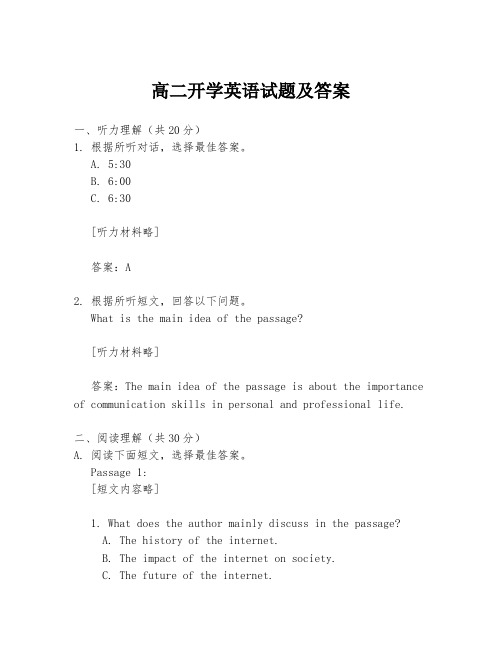
高二开学英语试题及答案一、听力理解(共20分)1. 根据所听对话,选择最佳答案。
A. 5:30B. 6:00C. 6:30[听力材料略]答案:A2. 根据所听短文,回答以下问题。
What is the main idea of the passage?[听力材料略]答案:The main idea of the passage is about the importance of communication skills in personal and professional life.二、阅读理解(共30分)A. 阅读下面短文,选择最佳答案。
Passage 1:[短文内容略]1. What does the author mainly discuss in the passage?A. The history of the internet.B. The impact of the internet on society.C. The future of the internet.D. The technical aspects of the internet.答案:B2. According to the passage, what is one of the negative effects of the internet?A. It has made communication easier.B. It has reduced the need for face-to-face interaction.C. It has increased the risk of cybercrime.D. It has improved the quality of education.答案:CB. 阅读下面的对话,回答以下问题。
Dialogue 1:[对话内容略]1. Why does the man refuse the invitation?A. He has to work overtime.B. He is not interested in the event.C. He has a previous engagement.D. He is not feeling well.答案:C2. What is the woman's attitude towards the man's decision?A. Disappointed.B. Understanding.C. Annoyed.D. Indifferent.答案:B三、完形填空(共20分)[完形填空文章及选项略]答案:1. A2. C3. B4. D5. A6. C7. B8. D9. A10. C四、语法填空(共10分)[语法填空文章及选项略]答案:1. that/which2. have been3. to find4. was5. their6. less7. has been8. of9. when10. to protect五、短文改错(共10分)[短文内容及错误略]答案:1. 第一行的 "and" 改为 "but"2. 第二行的 "a" 改为 "an"3. 第三行的 "effect" 改为 "affect"4. 第四行的 "than" 改为 "then"5. 第五行的 "it" 改为 "they"6. 第六行的 "are" 改为 "is"7. 第七行的 "for" 改为 "from"8. 第八行的 "less" 改为 "fewer"9. 第九行的 "on" 改为 "in"10. 第十行的 "an" 改为 "a"六、书面表达(共10分)根据题目要求,写一篇不少于120词的短文。
2019-2020年高二上学期入学考试试题 英语 含答案

万州二中高xx级高二上期入学考试英语试题2019-2020年高二上学期入学考试试题英语含答案第一部分:听力(共两节,满分30分)第一节听下面5段对话。
每段对话后有一个小题,从题中所给的A、B、C三个选项中选出最佳选项,并标在试卷的相应位置。
听完每段对话后,你都有10秒钟的时间来回答有关小题和阅读下一小题。
每段对话仅读一遍。
1. What will the girl be for Halloween?A. A robot.B. An alien.C. A ghost.2. What does the woman want to do?A. Get more paper.B. Recycle her paper.C. Throw out some garbage.3. What is the man’s problem?A. He is stressed.B. He can’t find his dog.C. He doesn’t like his work.4. What does the man mean?A. His clock is broken.B. He agrees with the woman.C. He listened carefully the whole time.5. Where does this conversation take place?A. At a play.B. At the movies.C. At a bar.第二节听下面5段对话或独白。
每段对话或独白后有几个小题,从题中所给的A、B、C三个选项中选出最佳选项,并标在试卷的相应位置。
听每段对话或独白前,你将有时间阅读各个小题,每小题5秒钟;听完后,各小题将给出5秒钟的作答时间。
每段对话或独白读两遍。
听第6段材料,回答第6、7题。
6. What is true about the woman?A. She is broke.B. She lost her wallet.C. She has only $5 now.7. What does the man want the woman to do?A. Lend him some money.B. Be friends with him.C. Pay him back.听第7段材料,回答第8至10题。
2019学年高二英语上学期开学测试试题(含解析)
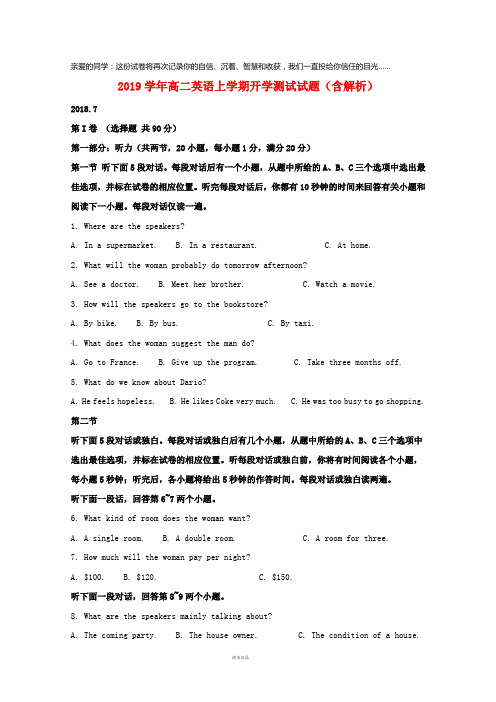
亲爱的同学:这份试卷将再次记录你的自信、沉着、智慧和收获,我们一直投给你信任的目光……2019学年高二英语上学期开学测试试题(含解析)2018.7第I卷(选择题共90分)第一部分:听力(共两节,20小题,每小题1分,满分20分)第一节听下面5段对话。
每段对话后有一个小题,从题中所给的A、B、C三个选项中选出最佳选项,并标在试卷的相应位置。
听完每段对话后,你都有10秒钟的时间来回答有关小题和阅读下一小题。
每段对话仅读一遍。
1. Where are the speakers?A. In a supermarket.B. In a restaurant.C. At home.2. What will the woman probably do tomorrow afternoon?A. See a doctor.B. Meet her brother.C. Watch a movie.3. How will the speakers go to the bookstore?A. By bike.B. By bus.C. By taxi.4. What does the woman suggest the man do?A. Go to France.B. Give up the program.C. Take three months off.5. What do we know about Dario?A. He feels hopeless.B. He likes Coke very much.C. He was too busy to go shopping. 第二节听下面5段对话或独白。
每段对话或独白后有几个小题,从题中所给的A、B、C三个选项中选出最佳选项,并标在试卷的相应位置。
听每段对话或独白前,你将有时间阅读各个小题,每小题5秒钟;听完后,各小题将给出5秒钟的作答时间。
每段对话或独白读两遍。
2019学年高二英语上学期期初考试试题(含解析) 新人教版
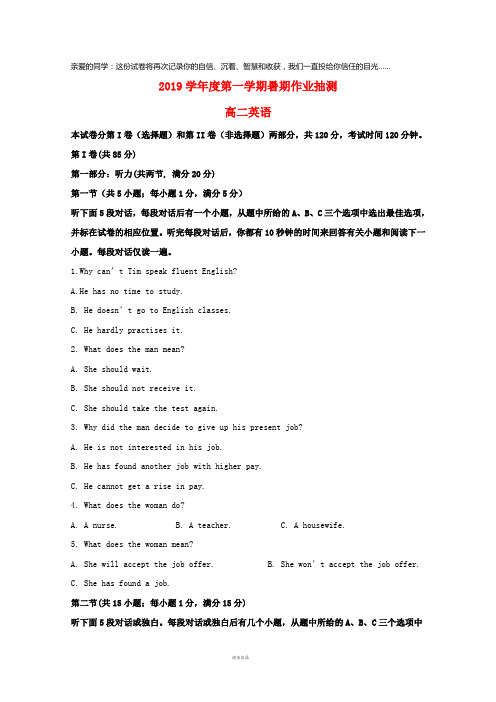
亲爱的同学:这份试卷将再次记录你的自信、沉着、智慧和收获,我们一直投给你信任的目光……2019学年度第一学期暑期作业抽测高二英语本试卷分第I卷(选择题)和第II卷(非选择题)两部分,共120分,考试时间120分钟。
第I卷(共85分)第一部分:听力(共两节, 满分20分)第一节(共5小题;每小题1分,满分5分)听下面5段对话,每段对话后有一个小题,从题中所给的A、B、C三个选项中选出最佳选项,并标在试卷的相应位置。
听完每段对话后,你都有10秒钟的时间来回答有关小题和阅读下一小题。
每段对话仅读一遍。
1.Why can’t Tim speak fluent English?A.He has no time to study.B. He doesn’t go to English classes.C. He hardly practises it.2. What does the man mean?A. She should wait.B. She should not receive it.C. She should take the test again.3. Why did the man decide to give up his present job?A. He is not interested in his job.B. He has found another job with higher pay.C. He cannot get a rise in pay.4. What does the woman do?A. A nurse.B. A teacher.C. A housewife.5. What does the woman mean?A. She will accept the job offer.B. She won’t accept the job offer.C. She has found a job.第二节(共15小题;每小题1分,满分15分)听下面5段对话或独白。
[精品]2019学年高二英语上学期期初考试试题(含解析) 新人教版
![[精品]2019学年高二英语上学期期初考试试题(含解析) 新人教版](https://img.taocdn.com/s3/m/ecb5963048d7c1c709a14522.png)
2019学年度第一学期暑期作业抽测高二英语本试卷分第I卷(选择题)和第II卷(非选择题)两部分,共120分,考试时间120分钟。
第I卷(共85分)第一部分:听力(共两节, 满分20分)第一节(共5小题;每小题1分,满分5分)听下面5段对话,每段对话后有一个小题,从题中所给的A、B、C三个选项中选出最佳选项,并标在试卷的相应位置。
听完每段对话后,你都有10秒钟的时间来回答有关小题和阅读下一小题。
每段对话仅读一遍。
1.Why can’t Tim speak fluent English?A.He has no time to study.B. He doesn’t go to English classes.C. He hardly practises it.2. What does the man mean?A. She should wait.B. She should not receive it.C. She should take the test again.3. Why did the man decide to give up his present job?A. He is not interested in his job.B. He has found another job with higher pay.C. He cannot get a rise in pay.4. What does the woman do?A. A nurse.B. A teacher.C. A housewife.5. What does the woman mean?A. She will accept the job offer.B. She won’t accept the job offer.C. She has found a job.第二节(共15小题;每小题1分,满分15分)听下面5段对话或独白。
2019-2020年高二上学期入学考试 英语 含答案(I)
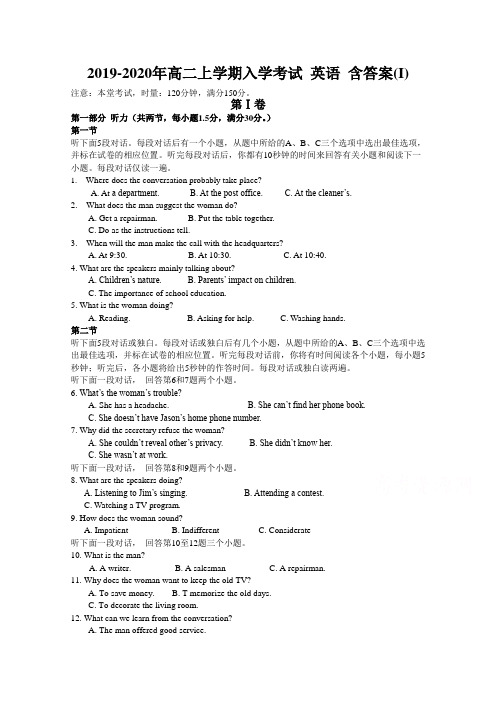
2019-2020年高二上学期入学考试英语含答案(I) 注意:本堂考试,时量:120分钟,满分150分。
第Ⅰ卷第一部分听力(共两节,每小题1.5分,满分30分。
)第一节听下面5段对话。
每段对话后有一个小题,从题中所给的A、B、C三个选项中选出最佳选项,并标在试卷的相应位置。
听完每段对话后,你都有10秒钟的时间来回答有关小题和阅读下一小题。
每段对话仅读一遍。
1.Where does the conversation probably take place?A. At a department.B. At the post office.C. At the cleaner’s.2. What does the man suggest the woman do?A. Get a repairman.B. Put the table together.C. Do as the instructions tell.3. When will the man make the call with the headquarters?A. At 9:30.B. At 10:30.C. At 10:40.4. What are the speakers mainly talking about?A. Children’s nature.B. Parents’ impact on children.C. The importance of school education.5. What is the woman doing?A. Reading.B. Asking for help.C. Washing hands.第二节听下面5段对话或独白。
每段对话或独白后有几个小题,从题中所给的A、B、C三个选项中选出最佳选项,并标在试卷的相应位置。
听完每段对话前,你将有时间阅读各个小题,每小题5秒钟;听完后,各小题将给出5秒钟的作答时间。
2018-2019学年高二上学期入学考试英语试题含解析
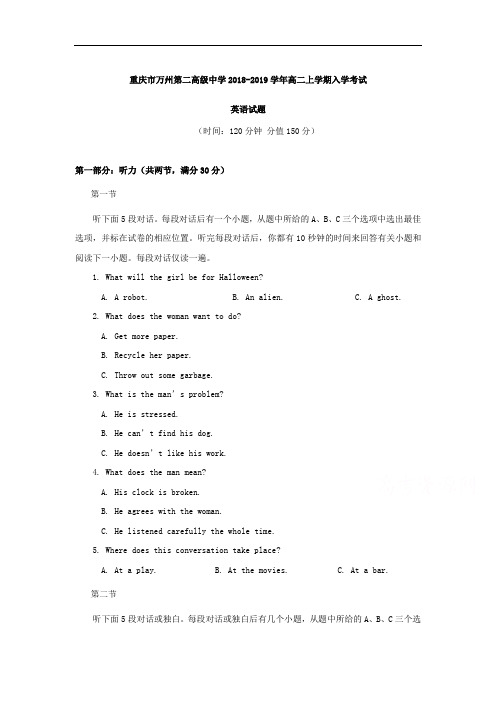
重庆市万州第二高级中学2018-2019学年高二上学期入学考试英语试题(时间:120分钟分值150分)第一部分:听力(共两节,满分30分)第一节听下面5段对话。
每段对话后有一个小题,从题中所给的A、B、C三个选项中选出最佳选项,并标在试卷的相应位置。
听完每段对话后,你都有10秒钟的时间来回答有关小题和阅读下一小题。
每段对话仅读一遍。
1. What will the girl be for Halloween?A. A robot.B. An alien.C. A ghost.2. What does the woman want to do?A. Get more paper.B. Recycle her paper.C. Throw out some garbage.3. What is the man’s problem?A. He is stressed.B. He can’t find his dog.C. He doesn’t like his work.4. What does the man mean?A. His clock is broken.B. He agrees with the woman.C. He listened carefully the whole time.5. Where does this conversation take place?A. At a play.B. At the movies.C. At a bar.第二节听下面5段对话或独白。
每段对话或独白后有几个小题,从题中所给的A、B、C三个选项中选出最佳选项,并标在试卷的相应位置。
听每段对话或独白前,你将有时间阅读各个小题,每小题5秒钟;听完后,各小题将给出5秒钟的作答时间。
每段对话或独白读两遍。
听第6段材料,回答第6、7题。
6. What is true about the woman?A. She is broke.B. She lost her wallet.C. She has only $5 now.7. What does the man want the woman to do?A. Lend him some money.B. Be friends with him.C. Pay him back.听第7段材料,回答第8至10题。
- 1、下载文档前请自行甄别文档内容的完整性,平台不提供额外的编辑、内容补充、找答案等附加服务。
- 2、"仅部分预览"的文档,不可在线预览部分如存在完整性等问题,可反馈申请退款(可完整预览的文档不适用该条件!)。
- 3、如文档侵犯您的权益,请联系客服反馈,我们会尽快为您处理(人工客服工作时间:9:00-18:30)。
屯溪一中高二英语试卷本试卷分第I卷和第II卷两部分(满分150分)第I卷一. 听力理解(共20小题;每小题1.5分,满分30分)第一节(共5个小题;每小题1.5分,满分7.5分)听下面5段对话,每段对话后有一个小题,从题中所给的A、B、C三个选项中选出最佳选项,并标在试卷的相应位置。
听完每段对话后,你都有10秒钟的时间来回答有关小题和阅读下一小题。
每段对话仅读一遍。
1. What is Cha se’s hobby?A. Skiing.B. Writing.C. Collecting stamps.2. How much will the woman pay?A. $39.B. $35.C. $31.3. How does the man probably feel?A. Hopeful.B. Confused.C. Annoyed.4. What is the topic of the conversation?A. The lighting of the restaurant.B. The friendly staff.C. A romantic meal.5. What does the woman mean?A. She only buys things on sale.B. Even the special price is too high.C. The man should have gotten a better deal.第二节听下面5段对话或独白。
每段对话或独白后有几个小题,从题中所给的A、B、C 三个选项中选出最佳选项,并标在试卷的相应位置。
听每段对话或独白前,你将有时间阅读各个小题,每小题5秒钟;听完后,各小题将给出5秒钟的作答时间。
每段对话或独白读两遍。
听第6段材料,回答第6、7题。
6. Why is the woman talking to the man?A. She wants to see the doctor.B. She needs to email her doctor.C. She needs help logging in to the patient website.7. How often does the woman seem to go to the clinic?A. Every year.B. Every two years.C. Every four years.听第7段材料,回答第8、9题。
8. Why does the woman look up the weather report?A. She needs to pick up her son.B. She doesn’t trust the w eather news on TV.C. She wants to know if she should get her umbrella.9. What is the probable relationship between the speakers?A. Husband and wife.B. Classmates.C. Co-workers.听第8段材料,回答第10至12题。
10. Where are the speakers talking?A. In a classroom.B. On the beach.C. In an apartment.11. Why did Mary go to Xiamen?A. To learn some business skills.B. To escape Wuhan’s heat.C. To spend time with her uncle.12. What does Mary probably think about seafood?A. She thinks it was terrible.B. She doesn’t like it.C. She thinks it was delicious.听第9段材料,回答第13至16题。
13. How long before the scheduled time did the bus leave?A. Ten minutes.B. Thirty minutes.C. An hour.14. When did the woman probably get on the next bus?A. At 4:35.B. At 4:45.C. At 5:05.15. What is the man worried about?A. The daily expense.B. The woman’s safety.C. The public transportation.16. What does the woman decide to do in the end?A. Buy a car.B. Work for the newspaper.C. Complain to the local government.听第10段材料,回答第17至20题。
17. What did customers use to complain about?A. Not getting through to the restaurants.B. Paying a lot for delivery.C. Slow service.18. What is special about DoorDash?A. You can order from many places at once.B. You can check the progress of the delivery.C. The prices are lower than from the restaurants.19. What do we know about the work of DoorDashers?A. The hours are flexible.B. The pay isn’t very good.C. It’s a good way to promote themselves.20. Why do many restaurants like DoorDash?A. They don’t need to hire their own delivery workers.B. They don’t need to find correct change to pay the driver.C. They can pay for things up front like a delivery car and gas.第二部分阅读理解(共两节,满分40分)第一节(共15小题;每小题2分,满分30分)ALast year, when our three-year-old great-granddaughter Kylie was taken to see Santa Claus, she made sure to give him her wish list of toys. A week later, she ran into a different Santa in a mall. He stopped to ask what she wanted for Christmas. Kylie was surprised and let him know: "If you can't remember what I told you last week, how are you going to remember on Christmas Eve?!" (---Mary Paul, Milwaukee, Wisconsin) As my son Mike and I drove to the mall, we passed a Salvation Army Santa ringing his bell."Mike," I said, "there's Santa!" He shook his head. "That's just some guy in a Santa suit," he said. It saddened me to think that maybe my son no longer believed in Santa, and we drove the rest of the way in silence. At the mall, we spotted another Santa greeting young believers. Suddenly, Mike took off toward him. Turning back to me, he shouted. "Now, there's the real Santa!" (---Michael E. Fahey, Huntley, Illinois)We immigrated to America from China when I was six. Because I was shy and didn't speak English, I had few friends. My days were spent at home with my brother. Sometimes we'd help our neighbor Mr. Mueller pull weeds. One Christmas Day, there was a knock at the door. Grandma opened it, and there stood a big fellow in red with a snow-white beard, laughing, "Ho, ho, ho!" He handed out presents and made us laugh. I had so much fun. It was years later when I learned that our special Santa was our neighbor Mr. Mueller.(---Joanne Tang, Litchfield Park, Arizona)21. Why was Kylie surprised when running into a different Santa?A.Because she got what she wished.B.Because she knew who the Santa was.C.Because she wished to get another toy.D.Because she thought they were the same Santa.22. What would Mike's parent feel as to Mike's different attitudes towards Santa?A.Angry B.Confused C.Sad D.Unbelievable23. What did Mr. Mueller do on Christmas Day?A.He stood outside our house.B.He stayed with us in our home.C.He continued to pull weeds.D.He gave out gifts by acting as SantaBIf you rent an apartment in Beijing, you also rent the landlord or landlady for at least a year. It's important you find a good match because you have to deal with them in the long term. For me, it was love at first sight with the elderly couple who owns my apartment.It was quite a tough trying to find the right apartment when I first arrived in Beijing. The apartments were either unsuitable or I find fault with the owners who looked indifferent at bestand unfriendly at worst. But that all changed when the renting agent's car stopped in front of a hutong house in the heart of the capital.I saw an elderly couple, in their 70s perhaps, waving to me. They were warm and welcoming at first glance, and when I saw them attentively hanging up the curtains in what would become my bedroom, I was just about sold on the place and the owners!Chinese people talk about yuanfen, meaning fate that brings people together. Before I met my current landlords, I thought the concept of yuanfen was overrated. A generous landlady who liked me and wanted me to move into her apartment had used the term in reference to me. But it was this lovely couple that changed my mind about the concept.We have become accustomed to visiting each other at home. The couple's apartment is lovingly decorated, boasting a recent wedding photo of themselves taken in bridal wear. The landlord likes to smoke and sip tea, while the landlady takes great pride in her appearance.After three years, I dare say they treat me a bit like a “daughter”, despite having two grown sons, one of them close by. They give me gifts of tea or clothes, and I bring them souvenirs from my trips. A match made in heaven, indeed!24. How did the author feel about renting an apartment in Beijing?A.It was a piece of cake.B.There were lots of unfriendly owners.C.It was worth trying different apartments.D.It was not so easy to find a suitable apartment.25. What did the elderly couple do when they first met the author?A.They looked indifferent and find fault with the author.B.They gave a warm welcome and took good care of the house.C.They liked the author and wanted her to move into their apartment.D.They were nice and gave her gifts of tea or clothes.26. Which one is correct about the elderly couple?A.They are newly married.B.They are nice and easy to get along with.C.They love drinking tea.D.They live together with their two sons.27. Which one is the best title for this text?A.Love at first sight B.My experience in BeijingC.A lovely couple D.Heaven on earthCMarathon fever is sweeping this country. In recent years, China's ever-growing passion for marathons has been triggered by its economic development and health-conscious middle class. A large number of marathon runners are white-collar workers, civil servants and business people that are keen on leading a healthy lifestyle. Government support, social participation and strong marketing by the sports industry have gradually led to the rapid development of the marathon industry, which is currently valued at 70 billion yuan ($10.77 billion). Due to its large participation and nationwide media report, marathons are considered by local governments an important part of marketing their cities. Thus, many cities list unique routes across local scenic spots and historical attractions, not only to boost people's fitness, but also to promote local tourism.For many runners, marathons are a way of life." As we get older, the places and opportunities to meet new people decrease. I find that participating in marathons is a simple way to make friends," said Wu, who made many friends in the Xstop Running Community, a running club with 48,000 members established by Xtep, one of the leading distributors of sports merchandise in China."The sense of belonging and the mutual encouragement that exists within the running community are very attractive to many people. We easily befriend one another, since we have the same goal: to keep running and never stop," Wu said. Besides, a marathon can be a great way to explore new places. For a runner who also loves traveling, marathons are a solid choice. "Competing in an international marathon is a chance to experience a city or a country you've never visited before," said Meng, an experienced runner from north China's Tianjin Municipality, who often runs in London, New York and Melbourne.There's a unique perspective that people get running through the streets of a city, distinct ancient buildings or amazing natural settings, he explained, things that somehow just can't be seen by rushing in a car. In addition, during a race, streets are often closed off so you don't have to battle traffic.28.Which word has the closest meaning to the underlined word "triggered" in the first paragraph?___A.motivated B.solved C.battled D.increased29.Who is most likely to take part in the marathons___A.John,a company managerB.Jack,a middle-aged farmerC.Rose,a high school studentD.Maria,a retired teacher30.According to paragraph 3&4,which of the following statement is NOT true?___A.A marathon can be a great way to explore new placesB.There is few traffic in the streets during a marathon race.C.You see common sights by running through the streets of a cityD.Many people are attracted to mutual encouragement of the running community.31.Why do local governments support the marathons?___A.Because nationwide media coverage can make them famous.B.Because they realize the benefits for their citizens.C.Because local scenic spots and historical attractions can have unique routes.D.Because they want to make people healthier and boost tourism.DI began cycling in 2004 when I was a poor student. It was dangerous, sure, but cycling is the fastest, cheapest point-to-point form of transport in Melbourne. I own a car now, but that’s just for transporting the baby or groceries.I hate driving. So it’s been quite encouraging watching the growth in cyclist numbers over the past decade. It is said that over 10,000 cyclists enter the CBD (Central Business District) each day, taking pressure off public transport. But as more people take to cycling as a way of transport, the number of cyclists seriously injured or killed keeps increasing. And that is a sign that our infrastructure (基础设施) is still not good enough.Melbourne was once a dream for cyclists--flat, long, wide roads, with plenty of paths along rivers. Now, cycling can be deadly, with roads taken up by cars. I have a friend who broke her back and was lucky to escape death and others with broken bones. In my time riding, I’ve been forced off the road by a truck, cut off by four-wheel drives, and told to get off the road. Drivers are a particularly rude to cyclists. And that’s a sign of exactly one thing: inadequate infrastructure.We shouldn’t need to be ta ught how to coexist in the same narrow space. Drivers and cyclists should be kept apart. Designing bike paths so riders are channelled between moving cars andparked cars is deadly. All it takes is one daydreaming driver to fling open the door and you are gone. That’s what happened to the young university student James.This year, there are to be new cycling lanes (车道) built on Glen Road, where James died in 2010. But these lanes are not safe. Cyclists must still pass between two rows of cars.32. What does the underlined word “that” in Paragraph 2 refer to?A. Some people hating driving.B. More cyclists having accidents.C. More people choosing to cycle.D. Distracted driving happening a lot.33. What is the main idea of Paragraph 3?A. Many people are bad at cycling.B. There are many cars in Melbourne.C. It’s dangerous to cycle in Melbourne.D. Melbourne was once very beautiful.34. Which was the major cause of James’ death according to the author?A. Cross’ carelessness.B. A driver’s mistake.C. Unsafe bike paths.D. An outdated legal system.35. What is the purpose of the text?A. To stress the necessity of safe bike paths.B. To encourage readers to cycle.C. To criticize rude driving behavior.D. To tell a personal story.第二节(共5小题,每小题2分,共10分)根据短文内容,从短文后的选项中选出能填入空白处的最佳选项。
